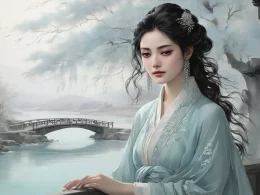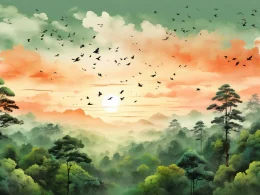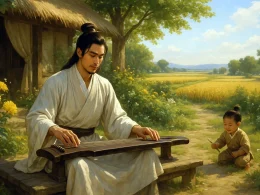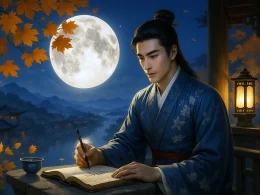Through willow-lined lanes the autumn wind begins to rise,
The frontier town lies desolate under bleak skies.
A horse’s whinny fades into the distance—
Where has the rider gone?
From the watchtower, a lone horn moans.
My heart is heavy,
Made heavier by withered grass and thinning mist.
It feels like those years
When the general’s troops snaked through the desert sands.
I remember West Lake’s shores,
Where we floated in small boats with singing girls,
Making merry among evening flowers.
Are those companions still there?
Now, I imagine, emerald fades and crimson falls.
I scribble a poem on silk,
Waiting for wild geese to carry it south—
But fear they’ll rush past,
Bearing no word, breaking promises made.
Original Poem
「凄凉犯 · 绿杨巷陌秋风起」
绿杨巷陌秋风起,边城一片离索。
马嘶渐远,人归甚处,戍楼吹角。
情怀正恶,更蓑草寒烟淡薄。
似当时、将军部曲,迤逦度沙漠。追念西湖上,小舫携歌,晚花行乐。
姜夔
旧游在否,想如今、翠凋红落。
漫写羊裙,等新雁来时系著。
怕匆匆、不肯寄与误后约。
Interpretation
Composed around 1190 during Emperor Guangzong's reign, this ci poem was written when Jiang Kui resided in Hefei. Though the city was once famed for its willow-lined streets, repeated warfare had left it desolate. Living amidst the sounds of neighing horses and distant horns, gazing at withered grasses and cold mists, the poet channeled his unrelieved melancholy into this work. Set to his original melody "Desolation Tune" (凄凉犯)—named after a mournful qin mode—the poem embodies sorrow through both lyrics and music. The preface further details Jiang's innovative "mode-blending" technique, showcasing his profound musical knowledge and metrical experimentation.
First Stanza: "绿杨巷陌秋风起,边城一片离索。马嘶渐远,人归甚处,戍楼吹角。"
Lǜ yáng xiàng mò qiū fēng qǐ, biān chéng yī piàn lí suǒ. Mǎ sī jiàn yuǎn, rén guī shén chù, shù lóu chuī jiǎo.
Through willow-lined lanes, autumn winds awake—
This frontier town's left bleak.
Warhorses' neighs fade,
But where's their riders' homeward track?
Only watchtower horns answer back.
The stanza immerses us in Hefei's wartime desolation through layered sensory details—visual (willows, bleak town), auditory (fading neighs, horns)—creating an atmosphere of abandonment and unease. The unanswered question "where's their riders' home?" underscores displacement's existential toll.
Second Stanza: "情怀正恶,更蓑草寒烟淡薄。似当时、将军部曲,迤逦度沙漠。"
Qíng huái zhèng è, gèng suō cǎo hán yān dàn bó. Sì dāng shí, jiāng jūn bù qǔ, yǐ lǐ dù shā mò.
My spirit sours—
Thin grasses, thinner mist devour.
Like troops of old,
Following their general's banner-fold,
Trudging through desert hour by hour.
Here, the poet's inner turmoil ("spirit sours") merges with the outer landscape ("thin grasses"). The simile of ancient soldiers marching through deserts transforms personal melancholy into a timeless meditation on the futility of conflict, blurring historical and contemporary suffering.
Third Stanza: "追念西湖上,小舫携歌,晚花行乐。旧游在否,想如今、翠凋红落。"
Zhuī niàn Xī hú shàng, xiǎo fǎng xié gē, wǎn huā xíng lè. Jiù yóu zài fǒu, xiǎng rú jīn, cuì diāo hóng luò.
I recall West Lake's pleasure-boats,
Where we sang as twilight floated,
Midst blooming notes.
Do those scenes still live?
Now likely—
Jade leaves wilted, scarlet rotted.
A sudden pivot to memory: West Lake's vibrant past ("singing," "blooming") contrasts with the imagined present ("wilted," "rotted"). This temporal juxtaposition—where recollection's warmth intensifies current grief—epitomizes Jiang's mastery of emotional counterpoint.
Fourth Stanza: "漫写羊裙,等新雁来时系著。怕匆匆、不肯寄与误后约。"
Màn xiě yáng qún, děng xīn yàn lái shí xì zhe. Pà cōng cōng, bù kěn jì yǔ wù hòu yuē.
I inscribe verses on silk skirts in vain,
To tie to wild geese when they come again—
But fear their hurried wings
May never bear these words,
Breaking promises they'd sustain.
The closing stanza weaves classical allusions: "silk skirts" (羊裙) reference Wang Xizhi's poetic calligraphy on a fan, while "wild geese" (雁) symbolize unreliable messengers. The poet's anxiety—that even art may fail to bridge separation—culminates in a profoundly modern sense of communication's fragility.
Holistic Appreciation
This lyric stands as a pinnacle of Jiang Kui’s artistry, where scenery and emotion merge seamlessly. The opening stanza paints a desolate autumn scene in a frontier town with stark realism—whinnying horses, distant bugles, cold mist, and empty watchtowers—each image steeped in postwar ruin and silence. The poet, present yet detached, is both observer and participant; his emotions arise naturally from the landscape, deepening layer by layer.
The latter stanza shifts abruptly, as present hardship triggers memories of past travels: painted boats, evening blossoms, and West Lake’s bygone splendor, vivid against the current desolation. The closing lines—hesitation to send a letter, fearing missed promises—heighten the sense of unspoken longing, leaving infinite resonance. Structurally, the lyric moves from concrete to abstract, its shifting cadences and winding emotions creating profound spatial and psychological depth.
Artistic Merits
- Concrete imagery conveys abstract emotion: The frontier’s autumn is not merely a metaphor for sorrow but a tangible atmosphere built through "willows," "horse neighs," and "bugle calls," intertwining external bleakness with inner turmoil.
- Fluid transitions between reality and memory: Juxtaposing recollections of past joy against present solitude, the lyric traces dual timelines of time and space, amplifying the rift between ideal and reality with a lament for lost glory.
- Allusions woven with subtle grace: The "ramie skirt"典故 (alluding to Wang Xianzhi’s calligraphy) expresses affection without artifice, while the imagined refusal of wild geese to carry letters closes the poem with poignant restraint.
- Musicality of a self-composed tune: As one of Jiang’s original melodies, the lyric balances structure and rhythm, using oblique tones to mirror plaintive moods—a testament to his musical genius.
Insights
Beyond autumn melancholy and traveler’s grief, this lyric harbors quiet reflection on turmoil and impermanence. Jiang Kui’s delicate brushwork captures solitude in chaos, and his nostalgia for lost companions resonates across centuries. Today, it reminds us: memory and longing are not just vessels of past tenderness but acts of resistance against barrenness. In a shifting world, preserving even a sliver of tenderness and clarity within the heart becomes the most resilient form of being.
About the poet
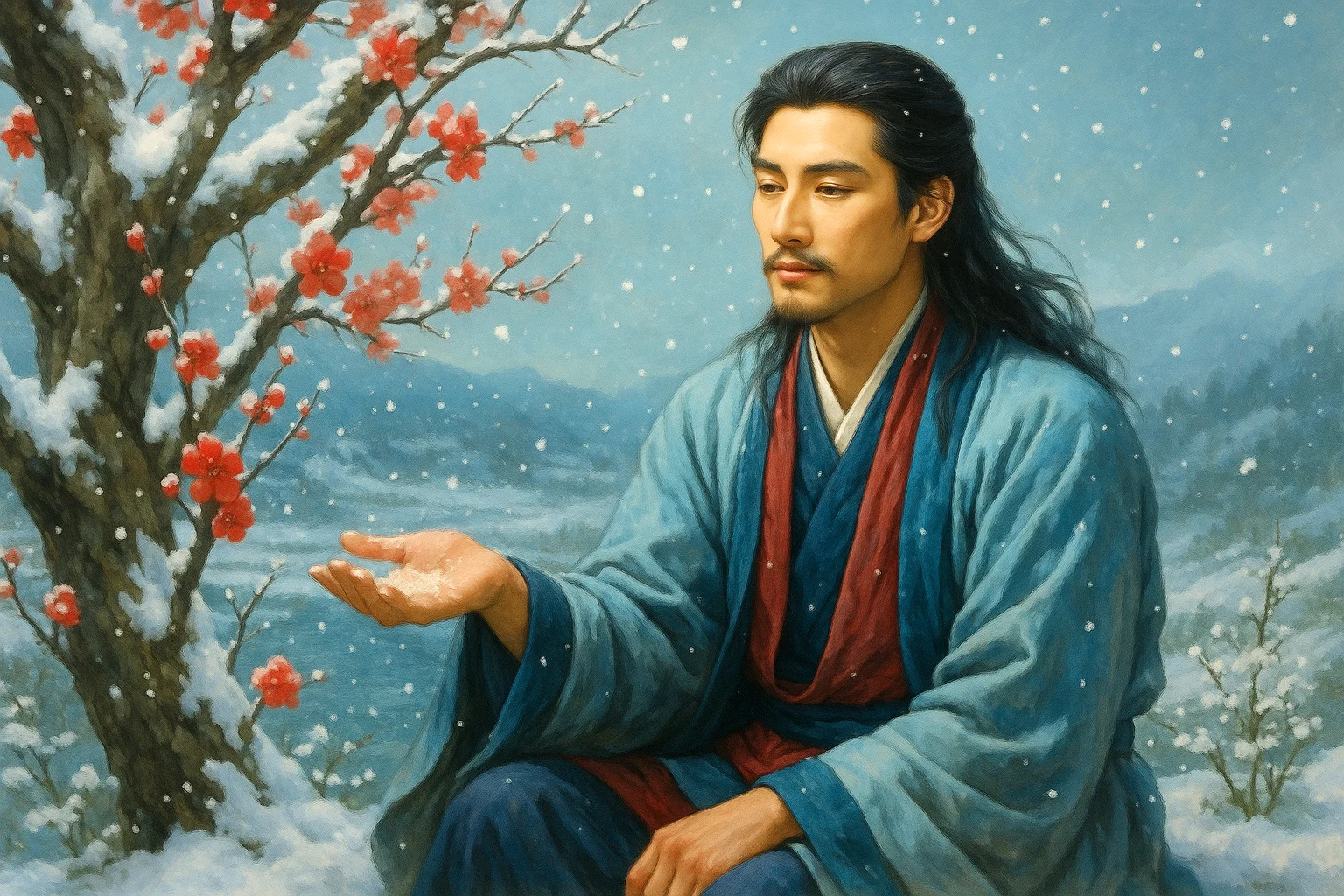
Jiang Kui (姜夔, c. 1155 - 1221), a native of Poyang, Jiangxi, was a Southern Song Dynasty lyric poet and musician. He remained a commoner throughout his life. His lyrics are known for their ethereal and austere style, and his poetry is also highly regarded. Along with Fan Chengda and Yang Wanli, he is celebrated as one of the "Four Great Masters of the Restoration."









